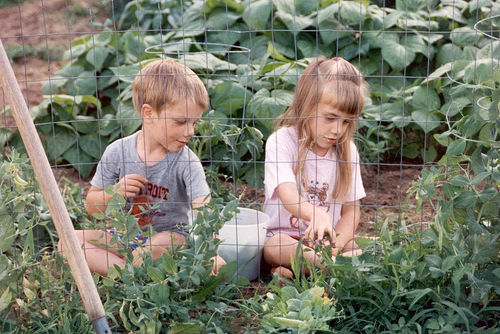parenting ? home management
When I was a little girl, I would work with my grandmother in her garden on the south side of her house, learning how to pick cherry tomatoes and spy the worms that destroyed the tomato plants. She also had a flower garden, which included columbines and sunflowers. I would pick up the garden hose and gently water the plants and, when I was done with that task, I would lightly weed around the plants. I loved spending time with her in the garden because it made me feel special; I was asked to fulfill a very important role as my grandmother?s helper.

?What better place to ?grow? special family memories than in a garden? Gardening?with your kids or grandkids at home or at a community garden not only provides?the tangible benefits of exercise and fresh food, it also fosters communication,?builds strong relationships, and offers an opportunity to work towards a common?goal.? ? KidsGardening.org
Grow Baby Vegetables
Debra at The Harried Mom does this with her kids, aged four and two. She says, ?I like to grow baby vegetables with the kids, kind of like their size and we also give them their own area in the garden to plant how and what they want.? According to the Texas A & M Horticulture Extension, most baby vegetables are fully ripe miniature vegetables cultivated for perfection. Others are immature vegetables picked before fully grown. They are as nutritious as regular-size vegetables and most offer a more tender and delicate taste. There are about 45-50 types currently marketed in the United States, which include baby corn, baby zucchini and baby carrots, among others. Buy vegetable plants at your local home store or online.
Plant a Butterfly Garden
KidsGardening.org recommends?including at least six hours of sunlight, colorful flowering plants, and leafy ?host plants? that attract egg-laying butterflies and provide food for the larvae. Not sure what to plant? Go for?perennials, such as aster, sunflower, milkweed/butterfly weed, lilac, and purple coneflower. Annuals are good, too?think?petunia, annual aster, marigold, and verbena species. Butterfly gardens are excellent learning tools for kids, because they are allowed to experience the developmental process of a butterfly! You can download a sample butterfly garden plan?and pick up tips for creating a homemade butterfly feeder, too.
Start With a Pot
Michele, mother of 6 grown children and grandmother of 5, suggests starting with container gardening. ?Children respond better to projects with immediate results, so planting potted flowers is perfect for them.??Container gardens offer the advantage of changing your garden with every season. The choice of plant material is limited only by your climate and your imagination. Another advantage is that container gardens give you the chance to experiment and try different plants. If you don?t like it or a plant is under-performing, it is easy to correct.
P.S. As you are gardening with your children, remember to teach them how to weed, too. It?s a skill you can take advantage of later on in life when they need a few bucks for going to the movies with their friends.
More resources on gardening with kids:
http://communitygarden.org/docs/10gardening_with_kids.pdf
http://www.forsmallhands.com/yard-garden?
Do you garden with your kids? What items do you grow?
Photo courtesy of Flickr. Featured image courtesy of Flickr.
 Desiree Allen is a thirty-something single parent with two children. A native of Denver, Colorado, she lived there until 2009, when she moved across the country to northern New Jersey with her kids. She is doing her best to avoid ?picking up? a Jersey accent, but she?s not making promises that she won?t eventually start sounding like some of her new friends. You can find her blogging at?Writing to Sanity?and tweeting?@writingtosanity.
Desiree Allen is a thirty-something single parent with two children. A native of Denver, Colorado, she lived there until 2009, when she moved across the country to northern New Jersey with her kids. She is doing her best to avoid ?picking up? a Jersey accent, but she?s not making promises that she won?t eventually start sounding like some of her new friends. You can find her blogging at?Writing to Sanity?and tweeting?@writingtosanity.
![]()
cagayan de oro cagayan de oro bowl schedule 2011 bowl schedule barry bonds hazing colton harris moore
No comments:
Post a Comment
Note: Only a member of this blog may post a comment.